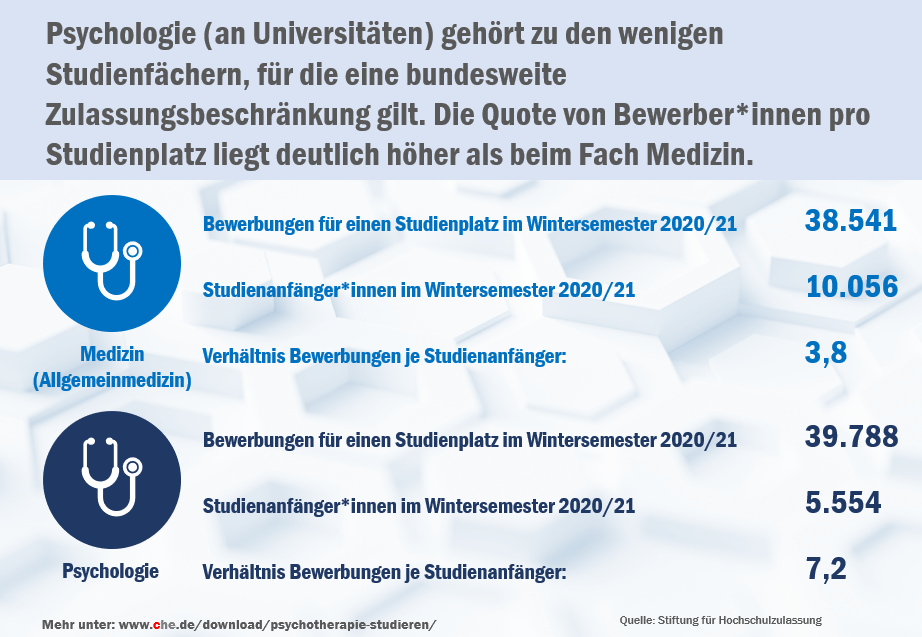
Psychology is one of the most popular subjects among students in Germany. Now, for the first time, aptitude tests are being held throughout the country prior to students embarking on a psychology degree. Also, new study options have evolved as a result of the reform of the academic training to become a psychotherapist in autumn 2020. A newly revised information brochure published by the CHE Centre for Higher Education explains why going abroad to study psychology on a programme with open admissions with a view to a career in psychotherapy could now lead to a dead end.
The number of psychology students in Germany has more than doubled in the last decade. In winter semester 2021/22, around 105,000 students were enrolled on a relevant degree programme, the majority of them in North Rhine-Westphalia, Baden-Württemberg or Thuringia.
But the demand for places exceeds availability. Psychology is one of the few disciplines that are still subject to admission restrictions nationwide. According to the Stiftung für Hochschulzulassung (Foundation for University Admissions), there were around 40,000 applicants for the 5,500 places available in winter semester 2021/22. The ratio of applicants to first-year students (7.2) is therefore roughly twice as high as that for medicine (3.8), for example.

Grafik: Psychology (at universities) is one of the few disciplines that are still subject to admission restrictions nationwide. The ratio of applicants to places is significantly higher than for medicine.
For this reason, many prospective students in the past have opted for degree programmes with less rigorous admission restrictions in other European countries, such as Austria, the Netherlands, England and Belgium. Addressing this aspect, CHE has now published a revised version of its guide “CHE kurz + kompakt: Psychotherapie studieren” (CHE short + compact – Studying psychotherapy) with additional answers concerning the issue of studying abroad.
“Transitioning from a Bachelor’s degree in psychology abroad to a Master’s degree in Germany, however, can soon lead to a dead end,” warned Cort-Denis Hachmeister. “Following the reform of psychology degree programmes in Germany, students intending to switch to a German university after completing their Bachelor’s degree abroad must now make sure that their undergraduate degree exactly matches the requirements of the Master’s degree programme or the licensing regulations for psychotherapists in Germany. Given the novelty of these programmes, there are unfortunately no precedents to guide us,” stated the psychologist and expert in access to higher education at CHE. Ultimately, decisions are made on a case-by-case basis, which can vary greatly depending on the location of the university and the state examination office concerned.
These changes were triggered by Germany’s new Psychotherapists’ Act, which came into force in autumn 2020. As a result, graduates of a relevant degree programme automatically receive their Approbation, i.e. the licence to practice psychotherapy. The new licensing regulations for psychotherapists require that students first pursue a so-called polyvalent Bachelor’s degree programme in psychology at a university. Only graduates of such a programme will be eligible for admission to a Master’s programme leading to Approbation, whereby the number of places on these programmes is lower than the number of places on Bachelor’s programmes. “As a result, access to a Master’s programme in Clinical Psychology and Psychotherapy represents the bottleneck that regulates the number of psychotherapists in Germany,” remarked Hachmeister.
Some universities, such as the University of Salzburg, have already announced that they will adapt their degree programmes to the reformed study programmes in Germany, enabling their graduates to achieve the transition from an undergraduate degree to a Master’s programme. Higher education expert Cort-Denis Hachmeister therefore advises psychology students abroad to contact their university of choice for pursuing a Master’s degree in Germany before completing their Bachelor’s degree. This would give them sufficient time to earn any further credits needed while they are still abroad, and to have them recognised.
“Given the many risks associated with recognition, German psychology students abroad should also consider completing their entire studies or the qualification to become a psychotherapist abroad,” Hachmeister advised. In addition, the newly introduced aptitude test for psychology gives prospective students the opportunity to improve their chances of securing a place on a Bachelor’s degree programme in Germany during the selection process. The days of testing (on 20 and 21 May 2023) will be held once a year in the future, revealing subject-specific skills in a similar way to the tests already in place for would-be medical students.
About the publication:
In the “CHE kurz + kompakt” series, each six- or 7-page edition provides answers to the key questions regarding the issue at hand. The information package, available in pdf format, is rounded off with an annotated list of links and checklists for progressing and looking into the matter in further detail. The publication entitled “CHE kurz + kompakt – Psychotherapie studieren” (CHE short + compact – Studying psychotherapy) was written by Cort-Denis Hachmeister.
CHE kurz + kompakt - Psychotherapie studieren 9. February 2021 689.87 KB 154433 downloads
Hachmeister, Cort-Denis: CHE kurz + kompakt - Psychotherapie studieren, Gütersloh,...
Foto: Gerd Altmann / Pixabay
